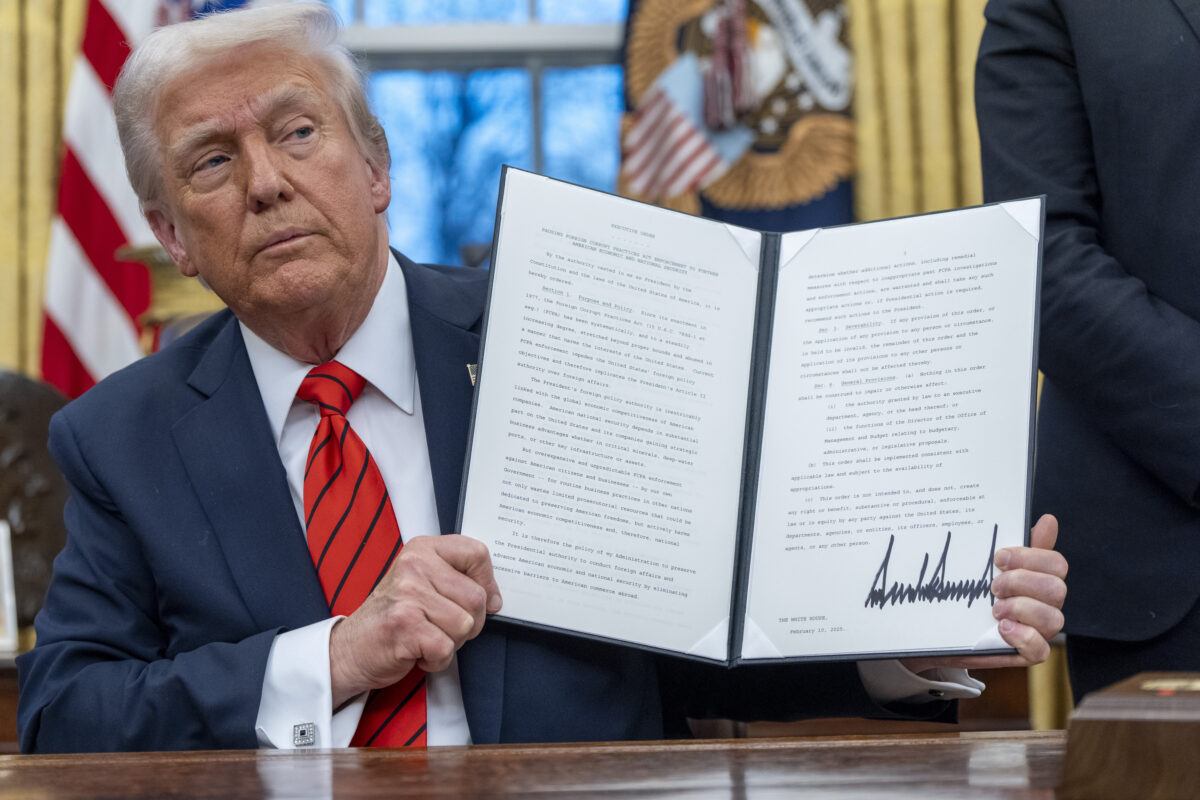‘Give Me a Break!’ Judge Shreds DOJ Attorney Defending Trump Executive Order Targeting Law Firm

AP Photo/Alex Brandon
A federal judge firmly swatted down a series of arguments from a Department of Justice attorney defending President Donald Trump’s executive order targeting the Jenner & Block LLP law firm at a hearing Monday, at one point uttering an exasperated “Give me a break!”
Judge John Bates with the U.S. District Court for the District of Columbia, a George W. Bush appointee, presided over Monday morning’s hearing with arguments from Michael Attansio with Cooley LLP, representing Jenner & Block, and Richard Lawson, the DOJ attorney who has been tasked with spearheading the Trump administration’s defense of his executive orders.
Since the beginning of his second term, Trump has issued a series of executive orders targeting by name multiple BigLaw firms that represented prominent Democratic clients like Hillary Clinton, refused to represent him or other pro-MAGA causes, hired former federal prosecutors that investigated him, or worked on the criminal cases he was facing before he won re-election.
The president’s social media posts and executive orders often lambast these firms using language accusing them of being “dishonest” and a “dangerous” risk to national security. The sanctions he has sought to impose include stripping the security clearances of the firms’ attorneys and staff (critically important for certain types of federal legal cases), terminating contracts the firms had with federal agencies, barring the firms’ employees from federal buildings (again, a major obstacle for the lawyers to represent their clients), demanding firms abolish diversity, equity, and inclusion (DEI) policies and programs, and threatening additional civil and criminal investigations against the firms.
A growing list of those firms have caved, like Paul Weiss and Skadden Arps last month, offering swift compliance with Trump’s decrees and millions of dollars of pro bono legal work to appease the president.
But a handful are digging in their heels and refusing to yield, even filing lawsuits to defend their rights. Thus far, Jenner & Block, Perkins Coie, Susman Godfrey, and WilmerHale have had some initial success in court, being awarded temporary injunctive relief pausing the brute force of Trump’s executive orders against them. Both Democrat and Republican-appointed judges have ruled against the Trump administration on these issues, finding the executive orders to be “likely unconstitutional.”
Monday’s hearing was to hear oral arguments for Jenner & Block’s motion to make the temporary injunction blocking Trump’s executive order against the firm permanent.
Editor-in-Chief of All Rise News Adam Klasfeld (former editor-in-chief of Law&Crime) reported on the hearing, chronicling Attansio’s repeated defensive blows against Trump’s executive order on constitutional grounds — the First Amendment rights of free speech and freedom of association, the Fifth Amendment right of due process, and the Sixth Amendment right of the firm’s clients to obtain the legal representation of their choice — defenses that Bates signaled he found persuasive.
Attansio cited both the chilling effect of the law firms that caved to Trump’s demands and multiple examples of how this executive order was targeting Jenner & Block for its protected speech.
By Klasfeld’s assessment, Bates seems poised to issue a more sweeping ruling striking down this executive order in its entirety than recent courts that have taken up the issue.
Attansio began by arguing that the DOJ had “offered zero” in its pleadings to rebut the court’s findings from the temporary injunction that the executive order was unconstitutional, and the constitutional violation was “even more clear now than it was.”
“The threat to the legal profession, the threat to Jenner, has only escalated,” Attansio continued, because Trump’s actions were “incentivizing” firms to “accommodate” their views to the administration’s over their own advocacy for their clients “or face the music” of a punishing executive order.
The judge did voice reluctance for his court to issue an order stopping Trump from making statements critical of Jenner & Block or other law firms, but seemed “receptive” to the law firm’s request for an order blocking Trump from issuing executive orders that were unconstitutional retaliation, Klasfeld reported.
The arguments then shifted to focus on the president’s power to control security clearances, which Judge Bates acknowledged is an area “where Trump has broad latitude,” wrote Klasfeld, but Attansio replied that the president’s actions were “so transparently retaliatory” that the judge did have the power to impose limits.
Attansio described Trump’s justifications for yanking Jenner & Block’s security clearances: “This is a bad law firm because of its speech. This is a bad law firm because it once employed a critic of the president.”
“That is a process that this court can review…There cannot be a Constitution-free zone,” argued Attansio, pointing out the more than 2,000 individuals, law firms, and organizations that filed amicus briefs in defense of his client — a “breathtaking left, right, conservative, progressive constellation” of supporters who agreed that Trump’s executive orders “undermine what it means to be a lawyer.”
Bates grilled DOJ attorney Lawson on the language from the executive order that was the president’s justification for revoking the law firm’s security clearances based on “the national interest,” and not national security.
“After the DOJ lawyer doesn’t know, Bates appears incredulous that he doesn’t have an answer,” tweeted Klasfeld.
When Lawson tried arguing that Trump’s decisions on security clearances were unreviewable, the judge posed a hypothetical: Could Trump deny security clearances for all Muslims or all Democrats?
Lawson conceded that would be reviewable, and Bates retorted to ask why a blanket denial for an entire firm wouldn’t be reviewable.
Klasfeld described Bates as having “raised his voice incredulously” in response to the DOJ’s arguments “multiple times,” making “repeated, indignant and scorching remarks,” demanding Lawson answer if Jenner & Block were “still entitled to due process.” Bates became “audibly frustrated” when Lawson tried to defend restricting Jenner & Block employees from federal government buildings on the grounds of opposing discrimination, wrote Klasfeld.
“Give me a break!” Bates scolded the DOJ.
Attansio closed by attacking the DOJ’s arguments as “like a game of Twister, verbal gymnastics, to justify this architecture of retaliation based on speech.”
“All we have to do is read this thing: It reeks of unconstitutionality,” argued Attansio. “It should be set aside, entirely,” because “it was set up to be a whole, to be one form of punishment, and it should be taken down the same way.”
Firms like Paul Weiss got relief from the entirety of the executive order against them “on bended knee,” Attansio concluded, and Jenner & Block should likewise get total relief under the Constitution.
Bates wrapped the hearing without issuing a ruling, telling the parties he would take some time to consider it and write an opinion. Regardless of which side ultimately prevails, an appeal is highly expected.





Comments
↓ Scroll down for comments ↓